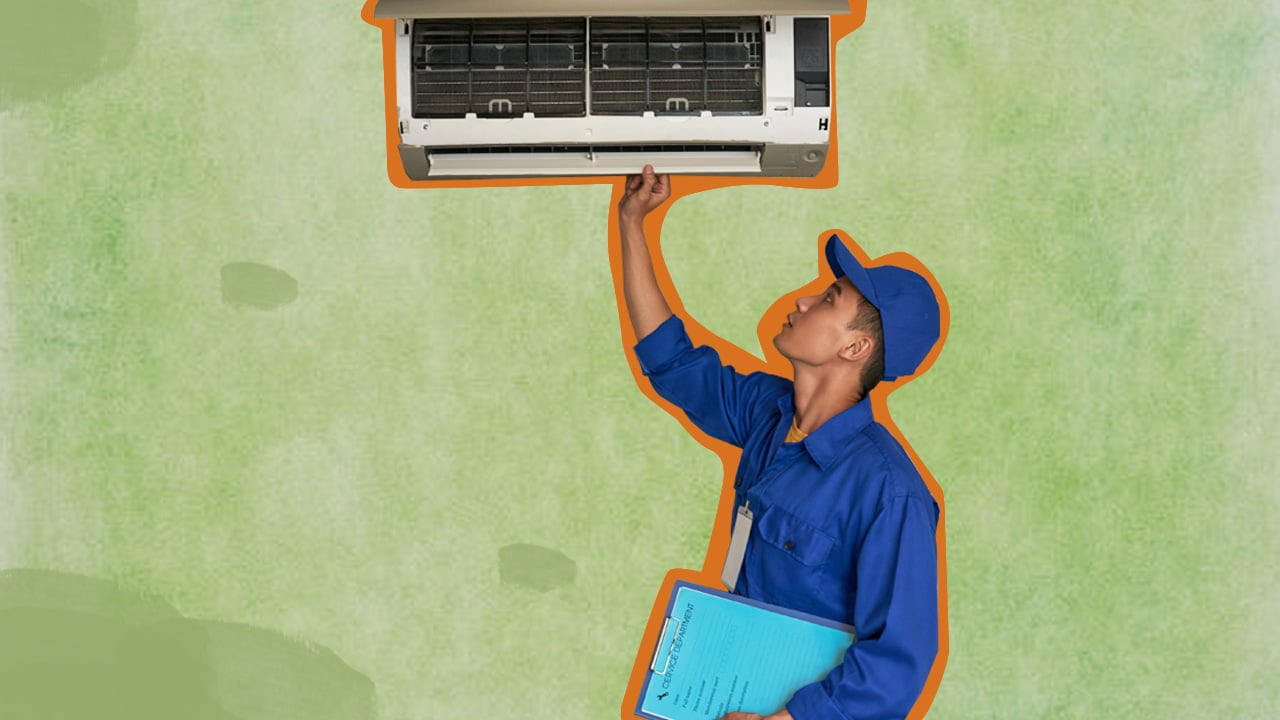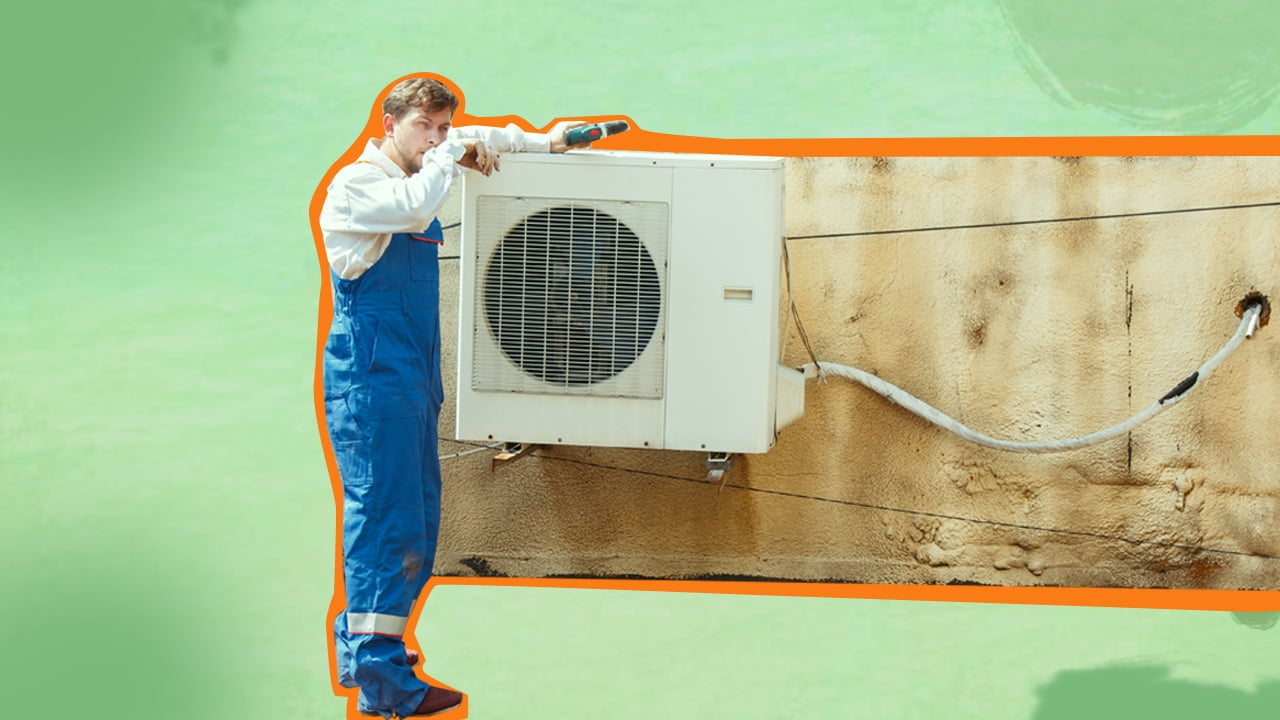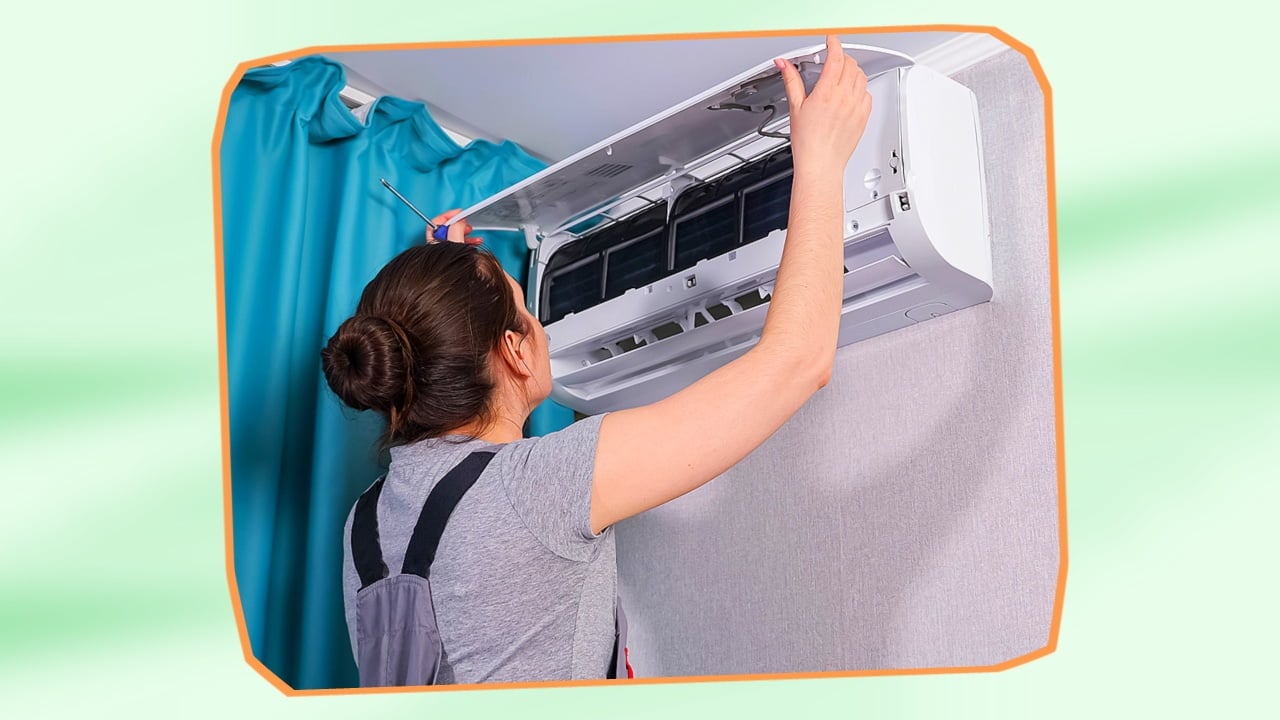Loose electrical connections, faulty motor and a malfunctioning capacitor could be the reason behind your buzzing AC unit. Seemingly minor issues can be fixed with simple repairs or replacements; however, you’ll have to change the unit if it’s old.

A loud buzzing noise coming from your air conditioner is a tell-tale sign that something is wrong with the system.
Usually, loud buzzing noises can be fixed by making simple repairs, but in the worst-case scenario, you may have to replace your air conditioning system. But how’d you understand whether your system needs to be repaired or replaced? That’s where this guide comes in.
Why Is My AC Unit Buzzing Every Few Minutes: Know What Each Noise Means

Compared to traditional air conditioners, modern products are integrated with sound-dampening technology to minimize noise. The noise level of such air conditioners is between 25 dB and 55 dB (decibels). While the former is similar to a whisper, the latter is much like a household conversation.
Even mini split ductless ACs and window units are fairly quiet in comparison to central ducted systems. That said, a noisy air conditioner is a sure-shot sign that the unit is on the fritz and calls for immediate attention.
Depending on the type of air conditioner you own, an air conditioner makes several noises. Different sounds mean different issues– therefore, understanding what each sound indicates is important.
1. Humming Noise
A soft humming sound coming from the air conditioner is nothing out of the ordinary, but a loud noise means one or more components are failing. Be it a window air conditioner or a central AC unit, there are various reasons behind the loud humming noise.
I. Bent Fin Coils
If your AC makes loud humming noises, check the fin coils because there’s a likelihood that they may have bent due to regular wear and tear. Bent fin coils are easy to fix, as a metal comb will help you straighten them.
II. Contactor Failure
A damaged contactor could also be responsible for the loud humming sound your AC unit is making. A contactor is a component that connects the unit to the electrical source, serving as a bridge between the two.
When the contactor fails, air conditioners make loud humming sounds and the AC will receive power, but it won’t switch on. If left untreated, this loud humming noise will change into a blaring buzzing sound.
III. Low Lubrication Level
Low humming sounds could also mean that the motor of your air conditioner needs to be lubricated. In case you continue running your air conditioner without lubricating the motor, the unit will start making sharp grinding sounds.
2. Buzzing Sound
Among air conditioner noises, a disturbing buzzing sound is also common. Mostly, air conditioners make a buzzing noise because of a refrigerant leak or damaged and failing components. However, there are other causes too, which are as follows:
I. Faulty Motor
Your air conditioner may be making loud buzzing sounds because of a defective motor. Such loud sounds are made when the copper tubes rub against each other due to obstructions. The key solution to preventing buzzing noise is to insulate the copper tubes well so that there is little to no metal-to-metal contact.
II. Loose Parts
Even a loose electronic component causes vibrations in the heating, ventilation, and air conditioning system (HVAC) and emits a loud buzz.
III. Capacitor Breakdown
The capacitor is a component that stores energy and releases it only when it is needed to power the outdoor unit of an air conditioner.
A faulty capacitor prevents the centrifugal fan motor from turning on, which causes friction and a buzzing noise. So, if you suspect the capacitor of the AC is damaged and making a buzzing noise, call an HVAC technician to inspect it.
3. Pulsating Noise
Is your air conditioner making a noise that is rhythmic and loud? Although slow pulsating noises coming from the indoor unit aren't problematic, loud ones call for an inspection. Your unit could be making pulsating noise because of either of the following reasons:
I. Loose Coil Or Fan Blades
If your indoor AC unit makes pulsating noises, chances are that the coil (inductor) or the fan (machine) blade may have loosened. This could be fixed without calling for professionals– you will have to tighten the bolts, and the AC will cease making pulsating noises.
II. Refrigerant Lines Touching The AC Walls
When refrigerant lines touch the walls of the AC unit, it pulsates and you’ll have to inspect them. You will have to add insulation to separate the lines from the walls and I would suggest using either foam or rubber.
III. Plastic Base
At times, it’s not the indoor unit that makes pulsating noise but the outdoor AC unit. The outside air conditioner unit makes strange noise only when the unit is supported by a plastic base. The only way to minimize vibrations and reduce noise is to dispose of the plastic pads and use wooden ones.
4. Banging Or Rattling Noise
An AC makes a rattling noise mainly when the condenser fan motor isn’t functioning properly. Fortunately, the condenser fan motor issue can be fixed easily, so you won’t have to shell out extra dollars to get it repaired.
Here’s what you should look for in your HVAC unit when it makes a rattling noise.
I. Broken Compressor Or Fan Motor
If your AC makes strange noises upon starting, the broken compressor might be responsible for that. A broken compressor cannot be repaired no matter what, so replacing it is the only option.
Keep in mind that replacing the AC compressor would cost you a lot of money. So, if your AC system is over a decade old, the best bet would be upgrading to a new air conditioner.
Another reason behind strange AC noises could be a broken fan motor. Much like the AC compressor, replacing the fan motor will be a costly affair. It’s best to contact an HVAC professional to determine the right solution in such cases.
Tip
Even loose screws could be the culprit behind the loud noise your AC is making. Not only the indoor unit but also the outside unit vibrates if any screw is loose. Fixing this is easy, so take a screwdriver and tighten the screws, and the loud noises will subside.
II. Dirt And Dust Particles Stuck In The Condenser
At times, neither the loose screws nor the damaged compressor or the fan motor are responsible for the strange noises your AC makes. Debris, dirt, dust particles, leaves, and sticks often cling to the condenser; hence, the AC makes noises.
This usually happens if the outside unit of your AC is surrounded by twigs, tiny leaves, and shrubs. Although you can clean the condenser by removing its cover, calling a professional would be the right thing if you aren’t confident in your DIY skills.
5. Screeching Or Squealing Noise
An air conditioner making a noise that is similar to screeching or squealing definitely needs repairs. There could be several reasons why your AC might be making such noises.
I. High Pressure In Compressor Unit
Often, strange AC noises like squealing or screeching are produced because of high pressure in the compressor unit. When high-pressure forms in your unit, switch off the AC immediately, or it will explode.
II. Broken Or Worn Out Fan Belt
An AC could also squeal or screech if the fan belt is broken or worn out. Such noises are mostly common in central air conditioners or ducted systems. Either the belt gets damaged due to regular wear and tear, or high humidity levels cause the belt to expand and contract, leading to weird noises.
III. Faulty Fan Motor Bearings
If your AC makes noises when you turn it on, it is highly possible that the fan motor bearings are damaged and need replacement.
6. Whistling Noise
Among the various AC noises, whistling is another common sound that you may hear if any component of your unit is faulty or broken. Your air conditioner may whistle because of several reasons.
I. Dirty Air Filters
When dirt or pet dander gets trapped in the air filter of an AC, they prevent air from flowing through it, pulling it back into the unit. Due to the lack of air, high-pressure forms on the blower fan motor, which is why the AC produces high-pitch whistles. Cleaning air filters is the only way to stop the whistling sound coming from the AC.
II. Leaking Duct
A leaky duct, usually in a central air conditioning system, can make whistling noises. Aside from the noise, leaking ducts jack up utility bills by causing energy loss, and sealing the duct is the only way to reduce the noise.
7. Gurgling Sound And Bubbling Sound
Like most other sounds, the gurgling and bubbling sound coming from the air conditioner indicates there is a problem with the unit. Your unit might be making gurgling and bubbling sounds because of the following.
I. Excess Moisture
Excess moisture buildup in the air conditioner could be the culprit behind the gurgling noise produced by the unit.
Moisture builds up in the AC when the condensate drain line is blocked. The condensate drain line is the component in charge of draining the moisture accumulated by the air conditioner from the indoor air. So, when the accumulated moisture isn’t drained out of the air conditioning unit, it makes a gurgling and bubbling sound.
You may also hear bubbling and gurgling sounds from the AC unit if the condensate pump isn’t functioning the way it should. The purpose of a condensate pump is to transport water to the condensate line from the drain pan. So, when too much moisture is accumulated in the condensate pump, the air conditioner starts producing a bubbling sound.
II. Inadequate Sealing Of Refrigerant Lines
Your AC unit could produce bubbling or gurgling sounds because of trapped air in the refrigerant lines. The only way to eliminate such noises is to seal the refrigerant lines.
8. Clicking Sound
Clicking sounds are fine as long as you hear them at the beginning and the end of a cooling cycle. But if you hear the clicking sound throughout the cooling cycle, something in your unit might be acting up. The reasons your AC unit is making clicking sounds are as follows:
I. Malfunctioning Thermostat
One of the possible reasons your AC unit is making a loud clicking sound is that your thermostat isn’t functioning properly.
Under normal conditions, the thermostat sends power to the air conditioner, which is why a soft clicking sound is produced. But, if there is a wiring issue, the relay switch will keep sending power, but the unit won’t turn on. In the process, the air conditioner will keep making loud clicking sounds.
II. Faulty Electrical Signals
In the event of a fault in electrical signals, your AC system will produce clicking sounds again and again. That’s because the electrical signal keeps sending electricity, turning the switch on and off.
The noises are sometimes accompanied by tiny sparks, which could be dangerous. That is why you must turn the unit off and contact a technician so that they can inspect it and figure out the issue.
III. Obstructions In The AC Fan
Sometimes, it isn’t the indoor unit that makes clicking sounds; rather, it’s the outdoor unit.
When the outdoor unit of your AC system produces loud clicking sounds, it indicates that something is obstructing the fan. You can fix this issue yourself without calling for professionals. All you will have to do is open the outdoor unit and wipe the fan blades using a clean cloth.

Air Conditioner Making Noise Every Few Minutes: Causes And Fixes
Occasional buzzing may not be as alarming as an AC unit that buzzes every few minutes. That’s because an AC unit buzzing every few minutes indicates a lot is wrong with it. A thorough investigation of the unit should be done to figure out which components are faulty and need repair or replacement.
In this section, I will discuss the causes of a buzzing noise in your air conditioner every few minutes. Also, I will walk you through the ways to fix them in the best possible way.
1. Contactor Relay Switch Failure
The thermostat is a component that connects with the air conditioner contactor, an electrical switching device responsible for activating the high voltage to the compressor. With regular usage, the contactor wears out, leading to a buzzing noise.
Solution
When troubleshooting the contactor relay switch, the first thing to do is to disconnect the AC unit from the electrical outlet. After that, inspect the switch to see signs of wear and tear. In case there are any or the switch is broken, dispose it of and install a new one.
2. Mechanical Cooling System Freezes Up
If there is a refrigerant leak, your AC unit will freeze and start producing a buzzing sound.
Solution
In case you suspect your air conditioner is making a buzzing sound because it has become cold, defrost it. You will have to turn the unit off and avoid running it for quite some time.
Then, after a brief period, turn the AC unit on and operate it at the lowest temperature to check whether it still makes the buzzing noise. In case the unit still makes noise, make sure to call professionals so that they can inspect the components.
3. Compressor Failure Or Misconfiguration
The task of a compressor is to maintain the right temperature and pressure in the refrigerant of the air conditioner. In case the compressor fails, it will send the wrong voltage, creating a buzzing sound.
A piece of advice: I suggest replacing the compressor of your AC unit every few years because it starts malfunctioning due to regular wear and tear. Proper maintenance would prevent the compressor from failing.
Solution
Since the only way to fix a failed compressor is to replace it, I suggest you refrain from taking the DIY route and call for professionals.
4. Isolation Foot Damage
Probably, you know that the compressor of the AC unit is connected to the base, which is supported by an isolation foot, i.e., a small rubber foot. Over a period of time, this natural rubber foot starts deteriorating, because of which the weight distribution is affected. As a result, the device starts buzzing.
Solution
Turn off the unit and inspect the isolation foot thoroughly to check whether there are signs of wear and tear or a crack. In case you notice any such signs, replacing the isolation foot is the only option. So, call an HVAC professional and get it replaced as soon as possible.
5. Refrigeration Pipes Vibrating
A vibrating refrigeration pipe could also lead to a buzzing sound, especially if your AC is too old. This usually happens when refrigeration pipes aren’t charged regularly, because of which they start shaking.
However, they could also vibrate if the expansion valve is incorrectly installed.
Solution
If you suspect your unit is buzzing because of refrigeration pipes, it’s best to call an AC technician who can inspect the unit thoroughly.
Why You Shouldn’t Ignore An AC Unit Buzzing Every Few Minutes
If your air conditioner starts buzzing frequently, you mustn’t disregard it as something insignificant. That’s mainly because such unusual or peculiar sounds alert you that your appliance is breaking down.
Even a minor issue like dirty fan blades or a blower motor needs attention, or they may turn into something major, requiring you to shell out a good deal of money. Not just that, but the damaged components of noisy air conditioners also compromise the efficiency and performance of the unit.

Final Thoughts
Only when an air conditioner is breaking down will it make strange buzzing noises? From blocked vents and faulty blower motors to broken components, there could be several reasons why your AC might be making weird noises.
To maintain the efficiency of the unit and the safety of your family, it’s essential to get the unit inspected by a professional. Ignoring such peculiar noises could slowly escalate into major repairs.
Although most issues can be fixed by repairing or replacing the components, you may have to replace the entire unit if it’s old. Remember - a stitch in time saves nine. That means the sooner you pinpoint the noise source, the easier it will be for you to repair the unit.
